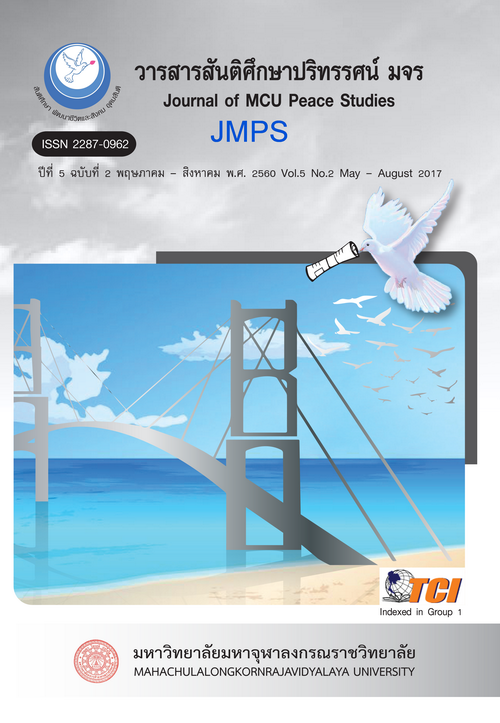The Ways to Strengthen Peace in the Society of Miracle of Life Foundation by Buddhist Peaceful Means
Main Article Content
บทคัดย่อ
This thesis, a qualitative research form done by the tools of documentation and the analysis with an in-depth interview of 5 informants of the groups of government official chiefs who joined ceremonies, coordinating staff, community leaders and the people who received the service, together with a participated observations, is of 3 objectives: (1) to study Sangahavatthu 4 in Buddhist Scripture, (2) to study contextual state of the works of Miracle of Life Foundation for the society, and (3) to analyze the ways to strengthen peace in the society of Miracle of Life Foundation.
From the research, it is found the followings:
1) Sangahavatthu 4 is the Dhamma of making peace to the society, comprising (1) Dana: the giving of materials and things, and Dhamma Dana and the Dhamma of forgiveness; (2) Piyavacā: the polite words which is useful and must be Subhãsitavãcã: well-spoken speech, true, nice, proper, and of harmonization for unity, including the advices, teachings persuading to the good ways; (3) Atthacariyā: the conduct rendering usefulness to oneself and other, sometimes this is called a “service-mind volunteer”; and (4) Samānattatā: the equality consisting participation in both happiness and sorrows, knowing one’s duty and behavior.
2) Miracle of Life Foundation has got continuously various projects complying with the Princess Ubolratana Rajakanya Siriwattnapannavadi’s Initiation, aiming to persuade Thai people in all sectors to perform good activities principles in working in the aspects of assisting the lessening of difficulties, occupation enhancement, and the creation of indiscrimination.
3) The ways of strengthening peace in the society of Miracle of life Foundation according to peaceful means are of the principles of Sangahavatthu 4 comprising: (1) Amisadāna: donating materials, consumer goods and properties as the first bridge to relief difficulties for the ones who get disasters, the urgent giving basic necessity of life, and Dhammas of giving knowledge and morality for living a personal’s quality life in the future, (2) Piyavacā: making a lovable discourse among one another, which is polite words in work coordinating for efficiency, (3) Atthacariyā: assisting people who are in difficulties, giving the poor youth chances to develop their lives, and (4) Samānattatā: always yielding assistance to the people encountering difficult situations from disasters, and assisting in performing Buddhist works in order that the youths will be close to Buddhism, continuously.Article Details
ทัศนะและความคิดเห็นที่ปรากฏในบทความในวารสาร ถือเป็นความรับผิดชอบของผู้เขียนบทความนั้น และไม่ถือเป็นทัศนะและความรับผิดชอบของกองบรรณาธิการ ยินยอมว่าบทความเป็นลิขสิทธิ์ของวารสาร


